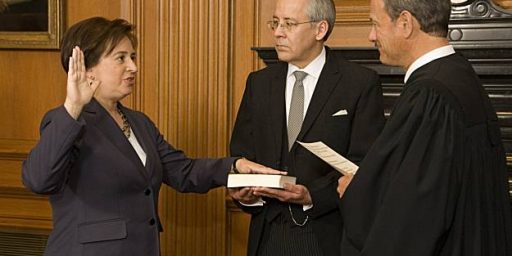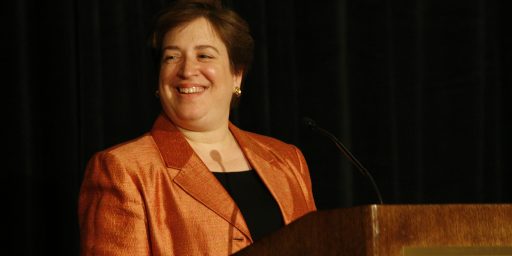Conservative Talking Points On The Kagan Nomination
 As David Weigel notes, the directions from which activists and pundits on the will attack the nomination of Elena Kagan to the Supreme Court are already fairly clear.
As David Weigel notes, the directions from which activists and pundits on the will attack the nomination of Elena Kagan to the Supreme Court are already fairly clear.
I. The Harvard Military Recruiters Controversy
Already this morning, one conservative blogger has called Kagan an “anti-military loon” for her role in banning military recruiters from Harvard Law School’s Office of Career Services:
[I]n 2003, Elena Kagan became dean of Harvard law school.
At the school’s first reunion for LGBT alumni, Kagan said the “military policy that we at the law school are overlooking is terribly wrong, terribly wrong in depriving gay men and lesbians of the opportunity to serve their country.”
As she wrote in an email to the Harvard Law community, her predecessor had “determined, as did all his counterparts at other law schools, that he should make an exception to the School’s anti-discrimination policy in the face of this threat to the University’s funding. I left this exception in force this year, once again because of the enormous adverse impact a prohibition of military recruitment would have on the research and educational missions of other parts of the University. This action causes me deep distress, as I know it does a great many others. I abhor the military’s discriminatory recruitment policy.”
In January 2004 Kagan and other Harvard faculty offered an amicus brief supporting the effort of a coalition of law schools challenging the constitutionality of the Solomon Amendment, arguing it violated university First Amendment rights of free speech. The schools called themselves the Forum for Academic and Institutional Rights, or FAIR. The case was FAIR v. Rumsfeld.
A Federal Appeals Court ruled later that year that the Solomon Amendment was unconstitutional and, the next day, Kagan issued an order banning military recruiters. Recruiters were still permitted to use the office of the school’s Veteran’s Association, however, and, ultimately, Kagan reversed the ban after the Federal Government threatened to withhold funds from the school if the ban was not lifted. Then, in 2006, the Supreme Court unanimously ruled that Federal Government could require universities to provide access to military recruiters as a consequence of receiving Federal funding.
Kagan will no doubt get grilled about this, but I can’t see it as being something that should disqualify her from serving on the Court, any more than it should have disqualified her from serving as Solicitor General.
II. The Experience Issue
Ed Whelan at The Corner sums up what is likely to be the first argument that many on the right will make:
Kagan may well have less experience relevant to the work of being a justice than any justice in the last five decades or more. In addition to zero judicial experience, she has only a few years of real-world legal experience. Further, notwithstanding all her years in academia, she has only a scant record of legal scholarship. Kagan flunks her own “threshold” test of the minimal qualifications needed for a Supreme Court nominee.
Whelan seems to conveniently forget, however, that, prior to being selected by President Nixon, William Rehnquist’s experience consisted of being a Supreme Court Law Clerk, thirteen years of private legal practice, and two years as an Assistant Attorney General under John Mitchell. As I noted in an update to James’s post this morning, there are several examples in recent history of Supreme Court Justices whose record of legal scholarship was minimal prior to being nominated. Given that, I think calling Kagan the least experienced nominee in 50 years is more than a little overblown
III. Goldman Sachs
It’s quite likely that Washington’s favorite Wall Street whipping boy will become an issue in the Kagan nomination because she did some consulting work for Goldman Sachs during the Bush years:
On Friday, a slew of inquiries was made to the White House and Justice Department about a minor post Solicitor General Elena Kagan once held at Goldman Sachs, the investment bank under fire over controversial mortgage securities transactions. Kagan served on a Goldman advisory council between 2005 and 2008, with the task of providing expert “analysis and advice to Goldman Sachs and its clients.” For her work she earned a $10,000 stipend.
All of this was disclosed when Kagan went through the confirmation process to become Solicitor General, but now that Goldman Sachs is in the news, you can expect that Republicans on the Judiciary Committee will want to know what she did for the company, even though it’s highly unlikely it was anything signficiant.
IV. The “Socialism” Thesis
Last week, Michael Goldfarb at The Weekly Standard broke the news that Kagan had written her Princeton University senior thesis on the history of socialism in New York City:
What were Kagan’s own ideas?
“In our own times, a coherent socialist movement is nowhere to be found in the United States. Americans are more likely to speak of a golden past than of a golden future, of capitalism’s glories than of socialism’s greatness. Conformity overrides dissent; the desire to conserve has overwhelmed the urge to alter. Such a state of affairs cries out for explanation. Why, in a society by no means perfect, has a radical party never attained the status of a major political force? Why, in particular, did the socialist movement never become an alternative to the nation’s established parties?”(pp. 127)
“Through its own internal feuding, then, the SP exhausted itself forever and further reduced labor radicalism in New York to the position of marginality and insignificance from which it has never recovered. The story is a sad but also a chastening one for those who, more than half a century after socialism’s decline, still wish to change America. Radicals have often succumbed to the devastating bane of sectarianism; it is easier, after all, to fight one’s fellows than it is to battle an entrenched and powerful foe. Yet if the history of Local New York shows anything, it is that American radicals cannot afford to become their own worst enemies. In unity lies their only hope.” (pp. 129-130)
Her political sympathies (at the time) seem quite clear — and radical.
Somehow, I doubt that many Americans are going to care about something that Kagan wrote as an undergraduate in 1981, but you can count on the thesis being dissected, and receiving prominent, if distorted, attention from the likes of Glenn Beck.
There will, of course, be other, more ridiculous, lines of attack, such as the suggestion this morning that Kagan is somehow disconnected from the American people because her life in New York City means that she’s never really learned to drive a car. Unfortunately, I also think we’ll see at least a whispering campaign about her personal life, an issue which is so far from being relevant to my mind that it barely deserves to be mentioned.
None of these issues strike me as being sufficiently outrageous to make a Senate rejection a likely possibility. When Kagan was nominated for Solicitor General, seven Republicans (Coburn, Collins, Gregg, Hatch, Kyl, Lugar + Snowe) voted in favor of her. All it would take is one or two of these seven to stop any Republican effort to filibuster the nomination. Kagan will be confirmed, but you can expect that many Republican Senators up for re-election this year will use these talking points as an opportunity to help their own electoral prospects.
Update (Doug Mataconis): The Republican National Committee comes up with another talking point:
Republicans are questioning Elena Kagan’s ties to a liberal icon and the nation’s first African American Supreme Court justice, Thurgood Marshall.
In its first memo to reporters since Kagan’s nomination to the high court became public, the Republican National Committee higKagan quoted from a speech Marshall gave in 1987 in which he said the Constitution as originally conceived and drafted was “defective.” She quoted him as saying the Supreme Court’s mission was to “show a special solicitude for the despised and the disadvantaged.”
“Does Kagan Still View Constitution ‘As Originally Drafted And Conceived’ As ‘Defective’?” the RNC asked in its research document. “And Does Kagan Still Believe That The Supreme Court’s Primary Mission Is To ‘Show A Special Solicitude For The Despised And Disadvantaged’?”hlighted Kagan’s tribute to Marshall in a 1993 law review article published shortly after his death.
It is worth noting that in one very important respect, the Constitution as originally drafted was defective.
Further Update (Doug Mataconis): And, oh yea, the American Family Association is out with a statement saying that Kagan is unqualified to serve because she’s a lesbian.






But Arlen Specter voted against her last year and he is a principled Democrat.
Doug, I generally agree with you here. I do, however, think there is a place for asking a nominee questions about their personal life, including religion even though there can be no religious test for the position. Jurors are often asked to disclose their personal background and asked to confront the question of whether they can be impartial in a matters of personal importance.
I do not know whether Republicans have the ability though to ask such questions in a respectful manner. Politically they would probably be smart not to.
You forgot another problem with this nominee–we already have enough broads on the court.
The last thing we need are a bunch more feminazis in power telling us what to do. Hillary, the Wise Latina, and Nancy Pelosi are enough.
If this chick gets ratified, every branch of government will be controlled by dames. We will be the object of ridicule everywhere for this questionable turn.
The standards should be the same standards the Democrats held Bush’s nominees to.
…kinda hot too but in an androgynous Pat sort of way. Yeesh.
As I intimated in another post, this bird looks like Jon Lovitz in drag.
And how will she get through the confirmation process?
Acting!
Hey, you knew someone would have to throw in the Master Thespian bit.
I don’t see how that was a defect, the provision did not create or prolong slavery, nor did it have the opportunity to end it. The compromise wasn’t about whether or not to have slavery, but rather how slaves were to be counted and taxed.
Michael,
Then I guess I’ll just have to refer you to the Fugitive Slave Clause In Article IV, Section II as well as Article I, Section 9, Clause I
Ok, how about a different tack. Instead of (legitimately) deconstructing those who oppose her, how about making the case that she is a good candidate for a lifetime appointment.
Doug, those would be much better examples, yes.
Though being, as they were, a necessary part of a constitution that was meant to govern slave states without making slavery illegal, I still think it’s a stretch to call it a defect. If you want to call the lack of emancipation of slaves in the Constitution a defect, that I would agree with.
Michael,
Well if you want to get technical about it the Constitution as originally drafted was defective by virtue of the fact that it didn’t have a Bill of Rights.
I don’t necessarily agree with the way Justice Marshall used to the word “defective” but I also don’t think there’s much point in engaging in mindless worship of a Constitution that even it’s own drafters saw fit to significantly amend within a decade after it had been drafted.
charles austin, is anybody truly a good candidate for a lifetime appointment?
Wow, that link was good for a hearty laugh, and not just because they failed at spelling egg yolk.
Now I agree some of the questions do not raise concerns but how does a legitimate issue like lack of experience become a “talking point”? Also if the constitution has flaws we have a method to correct those flaws, amendments. The Supreme Court’s job is not to fix the flaws but to interpret what’s there.
Rough start Mataconis.
She looks like a poster child for the Obama diet!
To much salt?
I called them talking points because, well, that’s what they are.
I agree that experience and qualifications are relevant issues, perhaps the only relevant issues of everything I’ve heard about Kagan since her name was put forward.
Andrew Sullivan appears to be calling for outing.
There’s something odd here where one of the controversial policies she’s on the record about (Don’t Ask Don’t Tell) is based upon the notion that homosexuals can succeed without publicizing their sexuality. Is she proof?
First of all, I haven’t said I oppose her nomination. As with some others, I believe she is likely to be as good as I can expect from President Obama. I also believe that elections matter and that presidents should be given wide latitude in selecting justices. I suppose it may come as a surprise, but many of us libertarian-minded conservatives really do try to practice what we preach.
What I was noting is the kind of tired trope of attacking the fringe as a form of indirection or using up the oxygen in the room. There are always loonies and why most of those quoted get more than the time of day from polite society is more than I can understand. But I digress.
Of course there are people qualified to serve lifetime appointments on the Supreme Court. That doesn’t mean that changing the rules to eliminate lifetime appointments is a bad thing. I believe a 12 or 15 year single non-renewable term has a great deal of merit. And let’s clear the air about the members of the Supreme Court not be political. Justice Stevens probably should have retired years ago but waited in hope for a president he believed would appoint someone more to his liking.
FWIW, I am not qualified to determine who should sit on the court, other than perhaps to oppose some candidates who, to my laymen’s understanding, do not share my sense of what the proper method of interpreting the US Constitution should be.
She’s just a face and a social minority – a means to an agenda that has nothing to do with experience. We must fill available slots with a diverse American.
The goal here, as with Sotomayor, appears to not be excellence in jurisprudence, rather it is fulfilling some social agenda for the sake of diversity. She has very little experience, from what I have seen so far. I have also read that her legal contributions are rather pedantic (I’m not a legal scholar, but they’ve been described as “uninspired, safe, and unremarkable” in the reviews I have seen so far).
Whatever happened to the concept of “the best person for the job?” Everyone knows why she’s being nominated, and it ain’t for her legal excellence…
Eugene Volokh finds her scholarship reasonably impressive.
That was also the case for Clarence Thomas, although I don’t recall any conservatives making this same argument when he was nominated to the Supreme Court…
I have to disagree with this comparison – if a case could be made for inexperience with Thomas, I seriously doubt that left would have felt it necessary to go through the whole Anita Hill circus.
Sorry, it is a non-starter to simply categorize every person from a minority, who is put forth by the GOP as a candidate for responsible positions in government, as being a “token.” This was done with Thomas, Rice, Watts, Powell, and Alito.
It has been the position of the left to automatically label black and other minority conservatives as somehow unauthentic or insufficient. They can’t seem to get their heads around the idea of a conservative person from a minority. Hopefully you are not joining in with that trend.
I’m generally a Thomas fan, but when George H.W. Bush got up and said he was the most qualified person in the country, that was just ridiculous.
Thomas was picked for a specific reason
From the Volokh article:
“This is partly because her work is in large measure structural and theoretical, rather than focusing on specific constitutional controversies.”
A good scholar is fine, (and he only really cites two of her offerings in support of his approval), but that’s exactly my point – it’s all white papers and limited real experience.
I don’t know who is making this particular argument, other than you…
Umm, no, as I would not include Thomas in the same realm as Powell or Rice…hopefully you are not wearing ideological blinders which would prevent you from seeing that one of the main reasons Thomas was nominated was specifically because he is black…I thought conservatives were supposedly against affirmative action? Oh wait, Bush 41 isn’t a “real” conservative…nevermind…
If I accept your premise without contending it, let me ask a question if I may for the sake of discussion. Do you sincerely think that Republicans are inherently prejudiced against minorities and it is a naked political ploy to place a minority in a position of responsibility in a Republican administration?
Conversely, do you think that Democrats are inherently supporting minorities, and standing against racism, by using skin color, ethnicity, and / or sexual preferences as a primary factor in selecting the “right” candidate for a position (e.g. “we need more women on the Court, it’s time for a gay SC nominee, etc” )?
Sincerely curious about your answer…
Perhaps some are, just as I’m sure some Democrats are, but not all, of course not…
In the case of putting Thomas on the Supreme Court, absolutely…
I’m sure many Democrats do, but the rub is that many Democrats openly talk about diversity and selecting people of color, women, etc. to diversify…Republicans are supposedly against such things, and yet, we have Clarence Thomas…the bottom line with him is this….do you think the color of his skin was not a factor in his being chosen? Do you really think he was the most qualified person Bush could have chosen? Or, rather, was he the best reliably conservative black man with previous judicial experience that Bush could have chosen…